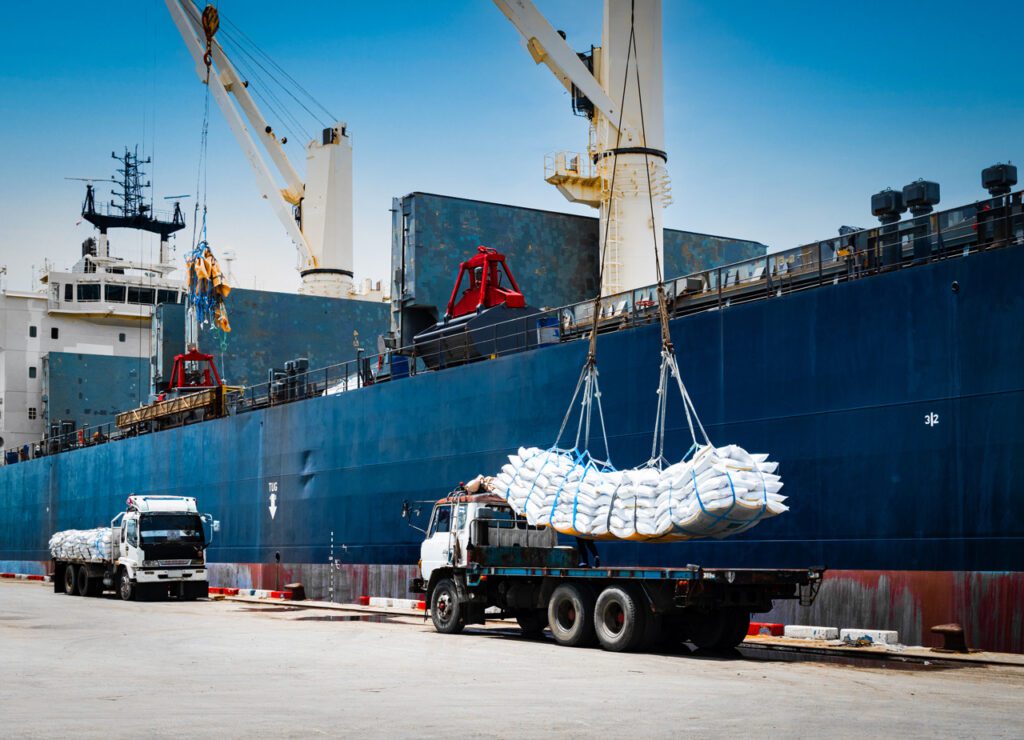Loading bagged sugar – a ‘perishable cargo’ requiring pre-shipment survey.
Introduction
The descriptive term ‘Perishable Cargoes’ can be applied to a wide range of cargoes, including both foodstuffs and even certain manufactured goods. It is essential that Members understand the full meaning of this term as the MM Rules of Entry require that any such cargo and the cargo holds in which it is to be stowed are certified by an MM approved surveyor as being fit for the intended voyage. This Risk Bulletin is focused on explaining the term ‘Perishable Cargoes, the pre-shipment survey and cargo care obligations and the potential negation of P&I cargo liability cover if these obligations are not fully complied with.
Background
Members are first referred to the reference to ‘Perishable Cargoes’ as contained in the following extract from the MM Club Rule Book (2022 Ed.), under Class I P&I, Rule 19 Loss of or damage to cargo, xiv) Perishable Cargoes (pg. 57).
- Perishable Cargoes
the Association will not be liable for claims arising out of the carriage of perishable cargoes unless;- pre-shipment survey carried out at the Member’s expense by a surveyor approved by the Association has determined that cargo is fit for the intended voyage, and
- the surveyor has confirmed in writing that the cargo space, ventilation equipment and stowage are fit for the intended carriage, and
- the Member complies with all recommendations made by the surveyor in connection with the carriage.
The Club’s survey and cargo care requirements are intended to protect the interests of its Members by optimising full compliance with the legal cargo care obligations imposed on the shipowner/carrier by the Hague Visby Rules and the associated Bill of Lading, inclusive of current best industry practice.
What are ‘Perishable Cargoes’?
An Internet review of both technical and legal definition sources reveals that the term ‘Perishable Cargoes’ or, interchangeably, ‘Perishable Goods’, can be misunderstood if viewed from the perspective of only some parts of the food cargo supply chain. For example, chilled and frozen foodstuffs are frequently shipped by air, road and sea. They, therefore, have a high ‘Perishable Cargo’ recognition profile.
Looking further, it becomes apparent that the term and its impact are wider than initially suggested. As an example, the World Trade Organisation’s Trade Facilitation Agreement (WTO TFA) provides the definition below:
“For the purpose of the WTO TFA, perishable goods are goods that rapidly decay due to their natural characteristics, particularly in the absence of appropriate storage conditions. They may be more vulnerable to external shocks and require special storage conditions. Perishable goods include agricultural products, fruits and vegetables, fresh meat, fisheries, etc.”
The WTO’s definition is useful but could be misconstrued as being restrictive in that it does not specifically extend to agricultural food products which are perishable over time and without proper care, but which are not as rapidly perishable as goods requiring refrigeration such as vegetables, fruit and fish. Examples of such perishable food commodities include bagged or bulk rice, soya beans, grains (including but not limited to wheat, barley, oats, etc.) and sugar, all of which will perish if not properly loaded, stowed, cared for and discharged.
The fact that non-refrigerated goods can also be correctly described as ‘Perishable Goods’ is supported by other definitions which can be found in legal dictionaries. Examples include the following extracted texts.
“PERISHABLE GOODS, goods which are lessened in value and become worse by being kept.”
“Perishable Goods means such of the Goods as shall be in fact or law liable to deteriorate in quality and/or value and shall include, but not be limited to, fruits, vegetables, dairy products, meat, etc.”
NOTE: To avoid any misunderstanding, MM wishes to make it clear to its Members that with respect to the definition of the words ‘Perishable Cargoes’, as used within the MM Club Rule Book, that these words include all the non-refrigerated but still perishable food commodity cargoes referred to above.
Perishable Cargoes and Pre-shipment Survey: what is required?
As previously noted, the Club Rules require that a Club approved surveyor conduct a pre-load survey of any cargo designated as a ‘Perishable Cargo’ and the vessel itself. The surveyor will, as necessary, also provide recommendations relating to the care of the cargo during its carriage on board.
In order to explain the Club’s ‘Perishable Cargo’ survey requirements, a step-by- step outline of this process is provided as below:
- Appointment of an MM Approved Surveyor.
- An experienced surveyor, who has first been formally approved by the Club, should be appointed by the Member well in advance of the designated vessel’s arrival at the load port.
- Master to be advised immediately of the surveyor’s full name, his role and 24/7 contact details.
- The surveyor’s fees are to be paid in full by the Member.
NOTE: If there is any doubt as to whether a scheduled cargo is in fact an MM Club Rule Book ‘Perishable Cargo’, the Member should confer immediately with the Club to obtain written clarification.
- Pre-attendance information to be provided to the Surveyor.
- The full contact details of the designated ship’s agent and the cargo shipper.
- The full details of the cargo to be loaded inclusive of quantity, packaging and marking and quality specification (inclusive of moisture content if applicable).
- Any special cargo care instructions provided by the shipper and/or charterer.
- The terms of the Charter Party which are relevant to determining the responsibility for the loading and stowage of the cargo and, with respect to bagged cargo, the vessel’s entitlement to reject any broken or stained bags and their replacement with sound cargo.
- Surveyor’s inspection of the cargo prior to loading.
- The surveyor should preferably attend at the place where the cargo is being stored prior to the vessel’s arrival alongside.
- The attendance should preferably be organised as a joint attendance with the cargo shipper’s and/or the charterer’s own surveyor.
- The surveyor should examine the condition of the cargo and its packaging or bagging to ensure that is all in conformity with the shipment details previously provided by the shipper and/or charterer.
- As appropriate, samples of the cargo for independent testing should be drawn, sealed, numbered and carefully retained and a set also provided to shipper’s and/or charterer’s surveyor.
- Any observed non-conformities, such as cargo or packaging or bagging wetting, staining or other damage or deterioration should be carefully noted and photographed, and a field report transmitted immediately to both the Member and the Club.
- Surveyor’s inspection of the vessel prior to loading.
- The surveyor should first meet with the Master and Chief Officer to ensure that they fully understand his role which is to assess the suitability of the vessel to carry the intended ‘Perishable Cargo’ and protect the Member’s interests.
- The surveyor’s inspection of the vessel itself will be focused primarily on the following cargo-worthiness factors:
- The weathertightness of the cargo hold hatch and access covers, inclusive of hatch seals, compression bars, securing devices and drain non-return valves. As appropriate, this may require hatch testing using either ultrasonic or high-pressure hose testing methods.
- The operation and control of the cargo hold ventilation system, including the operation and weathertightness of the ventilation closures during heavy weather.
- The cleanliness and freedom from vermin of the cargo holds in accordance with the regulatory standards required for the cargo being loaded.
- The structural condition of the cargo holds, inclusive of the integrity of all sounding and air pipes, as well as the proper securing of all tank top and other manhole covers.
- The testing of all cargo hold bilge suction systems.
- The integrity and operation of any fixed CO2 firefighting system fitted within the cargo holds, or, if not fitted, that the cargo to be loaded is a SOLAS and/or flag state exempted cargo category (see MSC.1/circ.1395/Rev.4, June 2019).
- Surveyor’s observations and recommendations.
- If the surveyor has observed any cargo and/or packaging/bagging non-conformities during the aforesaid cargo inspection process, he will refer the Master and Chief Officer to his cargo inspection field report and discuss those findings. The surveyor will also make recommendations which will include the need for the Master to confer directly with the Member and the Club and/or their local P&I Correspondent before permitting the cargo to be loaded on board.
- If the surveyor observes any pre-loading vessel structure or equipment non-conformities which may cause deterioration and/or damage to the cargo, then these non-conformities must be rectified – in full accordance with the surveyor’s specified recommendations – as a matter of priority and before the vessel departs from the load port.
- Subject to the nature of the ‘Perishable Cargo’ being loaded, the surveyor may also consider it appropriate to provide cargo handling and stowage recommendations. For example, when loading a bagged rice cargo, this would include the lining of the cargo holds and bulkheads with dunnage and kraft paper as well as the construction of ventilation channels within the cargo stow.
NOTE: Whether a Member elects to extend the surveyor’s pre-shipment ‘Perishable Cargo’ survey appointment to include his on-going attendance and assistance throughout the loading process is at the option of the Member. However, MM are of the view that when bagged rice and other similarly high value food cargoes are being loaded and discharged, the Member’s appointment of a protective surveyor would be a prudent risk management measure. - Any failure by the Member and/or their Master to comply fully with the surveyor’s ‘Perishable Cargo’ survey recommendations will, if cargo loss or damage result, impact negatively on the Member’s P&I cover.
Conclusion and Takeaway
The intention of this Risk Bulletin has been to clarify the meaning of the term ‘Perishable Goods’ within the context of the MM Club Rules Book requirement that the carriage of any such goods on board a Member’s vessel necessitates a pre-shipment survey of both the cargo and the vessel to confirm their suitability for the intended voyage.
MM’s advice to Members is that the term ‘Perishable Cargoes’ extends well beyond refrigerated foodstuffs to include all agricultural or other products which may perish and/or deteriorate over a period of time. With reference to MM cover under Class I P&I, Rule 19 Loss of or damage to cargo, xiv) Perishable Cargoes, this term includes bagged or bulk rice, soya beans, grains (including but not limited to wheat, barley, oats, etc.) and sugar, all of which will perish if not properly loaded, stowed, cared for and discharged.
Members should take special care to ensure that their ‘Perishable Cargo’ survey obligations are always fully complied with to minimise their risk exposure and avoid any potential negation of P&I cargo liability cover. Members who are in any doubt as to whether a scheduled cargo may be a ‘Perishable Cargo’ for MM P&I cover purposes should contact MM immediately for further advice.
Finally, and with reference to ‘Perishable Cargo’ security during loading and discharging, Members are referred to MM Risk Bulletin No. 49, Bagged Food Cargoes and Prevention of Stevedore Damage and Pilferage.

